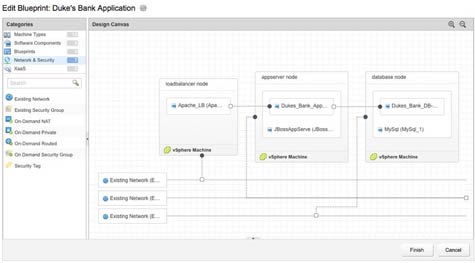Less than a day after becoming a party to the biggest merger in the history of enterprise IT, VMware today is back at it, making a push to dominate the future of IT management in the era of the cloud.
At the VMworld 2015 Europe conference today, VMware added updates to its framework for managing the hybrid cloud, made additions to its vCloud Air public cloud service, and launched a Network Functions Virtualization (NFV) initiative.
At the core of these initiatives is an update to the VMware vRealize Automation framework that adds support for an event broker and better defined application programming interfaces (APIs) that make it simpler to consume IT services. Also included is a series of VMware vRealize Automation 7 blueprints designed to provide a reference architecture for quickly deploying applications that not only reside in VMware vCloud Air, but also Amazon Web Services or any cloud that supports the Kilo edition of the OpenStack cloud management framework. VMware vRealize now also supports VMware Identity Manager in a way that brings multifactor authentication to cloud management.
At the same time, VMware has enhanced VMware vRealize Business Standard 7 by adding more granular tools for comparing costs of application workload deployments across private and public clouds, including as of this release Microsoft Azure.
Meanwhile, on its public VMware VCloud platform, VMware is adding support for Project Michigan, a set of network services through which IT organizations can dynamically spin up thousands of virtual machines and pay for them as they go. Other new capabilities include integration with Google Cloud DNS to simplify integration across Web applications running on both Google and VMware clouds, and finally the ability to run Docker containers on the VMware cloud platform.
Finally, VMware announced a program through which it will certify NFV modules that can run on top of its hybrid cloud computing platforms.
Christian Paulus, director of product marketing for Enterprise Cloud and DevOps Management at VMware, says that as hybrid cloud computing continues to evolve, it’s clear that IT organizations are taking approaches that extend their existing IT investments into the realm of the public cloud. As such, Paulus says VMware is focused on making it simpler for those organizations to use existing VMware tools to manage workloads that over time will be increasingly moving between private and public clouds.
The degree to which those workloads move between clouds will naturally vary by organization. But most IT organizations are not going to want to master multiple management frameworks inside and out of the cloud regardless of where any application workloads happen to be running at any given time.




